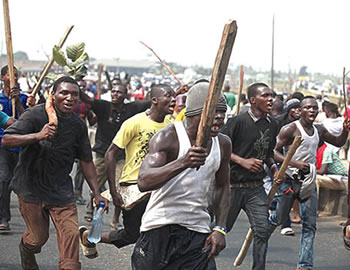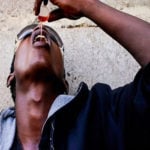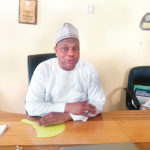During a recent meeting, the President of the United States of America, Donald Trump, informed President Muhammadu Buhari that United States would not accept the killing of Christians in Nigeria, adding that his country has serious issues with Christians being murdered and they would work on this challenge as they couldn’t allow it continue.
This is not the first wake up call for the Nigerian government and its people both at home and in the Diaspora that the rate at which human blood is being shed across the country had reached an unprecedented level.
In Nigeria, there was a movement by Christians nationwide; the Christian body went out of its cocoon to protest the continuous loss of lives as a result of massive killings in many states across Nigeria. Christians from various denominations took to the streets in major towns across Nigeria protesting the unabated killings of fellow Christians by unknown gunmen especially in Benue, Taraba, Nasarawa, Zamfara and other parts of North East Nigeria.
This is not a normal trend for Christians and Christian leaders but the continuous bloodshed across the country has given rise to the need to speak out before the situation regresses further and people resort to self help.
The General Overseer of The Redeemed Christian Church of God (RCCG), Pastor Enoch Adeboye, is one of the leaders that had spoken on the issue. Pastor Adeboye, warned that if Nigeria must live, the killings around the country must stop.
Pastor Adeboye was not the only one that decided to speak out. The Primate of the African Church, Dr. Emmanuel Udofia, also condemned the recent surge of killings by suspected herdsmen in Benue, Nasarawa and Taraba states, warning that Nigeria might be sitting on a keg of gunpowder.
And outside the religious circle, the story is the same. Nobel laureate, Prof. Wole Soyinka, stated that Nigeria is on a terminal nose-dive and must cry for international help while speaking at the 2018 Workers Day and called on President Buhari to order all land usurpers in the affected towns and villages across the country to vacate the forcefully occupied lands within 48 hours.
“Give a nationwide order to all land-usurpers in the affected towns and villages across the nation to quit those forcefully occupied lands within a forty-eight hour deadline. Issue orders to the military and police that, wherever illegal occupiers are found, they should be meted the same treatment as are accorded terrorists. Instruct all agencies that, once cleared of usurpers, the rightful occupants should be escorted back to their farmsteads and villages and provided maximum protection,” he stated.
That clerics are now speaking out in a manner that is hitherto out of its doctrines is not surprising. That almost every civil society organization and individuals as well as religious bodies now speak with a voice is also not extraordinary considering the daily rise in the figure of victims of gruesome murder across the country by unidentified armed men, militias and alleged armed Fulani herdsmen. Until some years back, the only form of violence known in the country was ethnic crisis within communities or religious crisis in some states in the north.
This however changed. What started like a child’s play took momentum speedily to become an issue that the international community continues to condemn and had given the country the label of a terrorist community. It started with local militias in the Niger Delta but quickly moved to the terrorism activities of Boko Haram and at present, Fulani herdsmen.
And across the country, the figure of casualties continues to rise while mass burial has become the order of the day in many communities. Few weeks back in Benue State, two catholic priests and 17 parishioners were gruesomely murdered in an attack by armed herdsmen who invaded St Ignatius Quasi Parish Ukpor-Mbalom in Ayar-Mbalom community of Gwer East Local Government Area and no fewer than 100 houses in the community were razed in the attack.
A week after the incident, about 10 people who were returning from morning mass were murdered by suspected herdsmen in military uniform in Naka, Gwer West Local Government Area while in many farming communities, men are killed just to get access to their land for cattle to graze while their wives and children are raped and murdered.
The story of woe cuts across many communities; in Irigwe Chiefdom of Miango Local Government Area of Plateau State, 99 persons were said to have been killed while 863 houses were burnt down during a five-month period by Fulani herdsmen. Also, 44 persons were said to have sustained gunshot injuries and over 24 persons consisting of women, children and the aged displaced in 26 villages.
Amnesty International also added to the figure, the body claimed that clashes between farmers and herdsmen have claimed at least 168 lives in January, 2018 alone. In a statement on Monday, Osai Ojigho, country’s director of the organisation, called on the government to find a lasting solution to the crisis.
“Clashes between herdsmen and farmers in Adamawa, Benue, Taraba, Ondo and Kaduna resulted in 168 deaths in January 2018 alone. Hundreds of people lost their lives last year, and the government is still not doing enough to protect communities from these violent clashes. Worse, the killers are getting away with murder. In 2017, 549 deaths were recorded across 14 states, while thousands were displaced,” Osai Ojigho, Country Director of Amnesty stated.
According to Amnesty, in 2017, clashes between nomadic herdsmen and local farmers resulted in at least 549 deaths and thousands displaced across Enugu, Benue, Taraba, Zamfara, Kaduna, Plateau, Nasarawa, Niger, Plateau, Cross Rivers, Adamawa, Katsina, Delta and Ekiti states.
And in many communities, 2018 has been a year that cannot be forgotten based on the loss of loved ones due to attacks. As of May 6, 2018, the country already had a statistics of about 2,000 people lost to violent deaths. The figure continues to rise; about 676 Nigerians were cut down through herdsmen and farmers clashes, sectarian crises, communal clashes, Boko Haram insurgency, cult clashes, kidnapping, and ritual killings in January.
Indeed, the North Eastern part of Nigeria has become an abattoir where human lives are taken in hundreds at a stretch; the North-Central and North-West follow closely as the vulnerable regions though the South-West, South-South and South-East have their share of bloodbath.
Before now, Borno State was the red zone for killings as the Boko Haram insurgents made the state home for their major activities. But today, Benue, Taraba and Adamawa have taken over as they regularly suffer attacks from killer herdsmen.
On January 1, no fewer than 21 persons returning from a midnight church service to usher in the New Year were killed by gunmen.73 people were massacred by herdsmen during coordinated attacks on communities in Logo and Guma LGAs of Benue State between January 1 and 6.
Three people were blown into pieces when a bomb planted by Boko Haram exploded in Madagali, Adamawa State. Herdsmen killed two in Awe LGA and three in Keana LGA of Nasarawa State. A traditional ruler, the Etum Numana, Mr. Gambo Makama, and his wife were shot dead and his son injured by gunmen in Southern Kaduna, Kaduna State. On January 3, 14 people died when a suspected Boko Haram militant blew himself up at a mosque in Gamboru, Ngala, Borno State.
In addition to the dreaded Boko Haram, Fulani herdsmen have taken over as another set of terrorists leaving death and sorrow in their wake in communities across the country.
Unlike the Boko Haram insurgency that has made the North its headquarters, the herdsmen have no boundaries. And today, many communities in the South-South and Southwest are falling as a pundit in the game of the herdsmen with so many women turned to widows overnight and children turned into orphans, handicapped people and refugees in their father land.
And as the people continue to call for a permanent solution to the issue of insecurity, many reasons have been given for the continuous trouble with terrorists and rampaging killer herdsmen. Some believe it is an agenda to wipe out a particular race and an ethnic cleansing while some believe I is as a result of the anti-open grazing law passed in some states and others believe it is due to religious extremism and intolerance.
The Catholic Archbishop of Abuja, John Cardinal Onaiyekan, at a public forum stated that the rise in religious extremism and fanaticism which began two decades ago is to be blamed for our current disharmony, insecurity and crisis.
“We have also seen that doctrinal extremism easily moves from oral violence to physical violence. Riots and murderous conflicts are a natural development from exclusivity fanatical rejection of the other. Some two decades or so ago, a negative development started to be witnessed by our people with regards to religious harmony. We began to see a rise in strict fanaticism, where people held so tightly to their own faith that they declared that they are the only ones acceptable to God. This leads to a total rejection of whoever does not follow his own line,” he said.
He added that the anomaly of the Boko Haram is a clear case in point. “It is clear now that it is not enough to condemn the violent activities of terrorists who kill and maim. We must also address the grave danger posed by those who preach rejection of other faiths, whether in their mosques or in their churches,” he explained.
And as the land continues to get soaked in blood giving rise to an increase in the figures of widows, internally displaced persons, orphans as well as people getting deformed and jobless while the statistics of dead people swells, people and organizations continue to call on government to do the needful before people will take up arms in defense and the country will find itself in anarchy or experience genocide.
The Yoruba Youth Council speaking through its president, Eric Oluwole, said the country cannot be built on bloodshed. “The killings must stop forthwith. How can we talk about building a country on bloodshed? The president must rise to the occasion. We cannot continue like this. Look at the North, South, East and West. Nigeria has become a war zone. It is sad and it must stop,” he said.
A peace and conflict analyst, Jude Nwabuokei from the University of Ibadan stated that it is important to find lasting peace as there is no way that the people can pretend that all is well. He added that the conflict zones must be identified and resolved for lasting peace to reign as soon as possible.
The pan Yoruba socio-political group, Afenifere, through its spokesperson, Yinka Odumakin stated that, “it is obvious that these killings are driving Nigeria to the precipice and unfortunately most of the killings have been linked to Fulani herdsmen who are terrorists. We condemn the bloodletting going on in the country unhinged, the security forces are either unable or unwilling to put a stop to it or arrest the masterminds and identify those involved in the bloodletting.”
The Ijaw Youth Council also believes that the killings are driving Nigerians to civil disobedience. The president of the group, Eric Omare said if things continue the way they are, Nigerians may resort to civil disobedience and heed calls to defend themselves.
The Arewa Youth Forum is of the belief that government has failed the people. Speaking through its president, Gambo Ibrahim Gugunju, the forum stated that the government has failed in providing security for its citizens and had only concentrated on tackling Boko Haram while there are federal crises worse than Boko Haram ravaging the nation. Gugunju stated that the government has failed and asked state governments to come together to help the situation.
Meanwhile president Buhari while on a visit to Taraba stated that all hands are on deck to tame the monster of violence in the country. At all levels of governance especially at the state, various efforts have been put in place to put an end to insecurity.
The National Economic Council early in the year set up a committee consisting of nine governors to collaborate with the federal government to find a lasting solution to insecurity in all its phases.
Special Forces were also deployed by the military to all vulnerable communities while cattle colonies are being established in some states.
Ultimately, the people have expressed the belief that the continued existence of the Nigerian state is dependent on the Nigerian government’s ability to live up to its responsibilities in tackling insecurity and stop shielding rampaging killers at the expense of its people.






